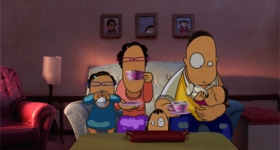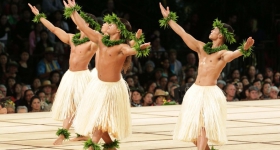Inside the 4 Star Theater's tiny snack counter, shrimp chips, Philippine dried mangos and Vietnamese fiery-hot roasted peanuts sit next to Red Vines and Junior Mints. A narrow, rickety staircase from the employee bathroom leads to the projector room, where huge platters spin miles of celluloid and projectors cast light on Chinese epic dramas and Japanese horror films. In one of the San Francisco theater's two screening rooms, moviegoers stare up at a red, art deco, tiled ceiling that hasn't changed since the theater's 1912 opening. It's hard to believe that 15 years ago the tiny theater was in shambles. The former tenants, angry about a rent increase, took off in a huff. "All they left were the toilet and the doors. They didn't want anyone to have it," owner Frank Lee recalls.
These days, Lee is beaming. In December, he won a costly, nearly three-year legal battle against a local church that wanted to buy the property. The former owner had sold the building to the Canaan Lutheran Chinese Church, but Lee had a petition with 12,000 names and a new city law protecting historical theaters on his side. Though he and his wife Lida also run two other small theaters in San Francisco, Lee says he's especially attached to the 4 Star-the last theater in the country to regularly feature first-run Chinese films. "It's our baby," he says.
Lee is 52 this year, but his boyish face doesn't show it. Growing up in San Francisco, he spent more time in movie theaters than at home. Between the mid-1960s and the early 1980s, his father operated several Chinese movie theaters and distributed Chinese movies throughout North America. When Lee was 13, he started working as an usher in his father's Bella Union theater on Kearny Street, where he first watched his all-time favorite movie: Lady General Hua Mulan. (Since the Hong Kong film was released in 1963, he's seen it more than 100 times). Though he's a second generation Chinese American, he speaks fluent Cantonese and understands Mandarin. He learned Chinese by watching hundreds of his father's movies.
His father, a North American film distributor for the famed Hong Kong producers, the Shaw Brothers, cultivated Lee's cinematic taste. Through productions like Duel of the Iron Fist and The Flying Guillotine, the Shaw Brothers Studio was one of the main forces responsible for developing Hong Kong's legendary martial arts industry. Besides film distribution, Frank Sr. ran movie theaters in the Chinatowns of San Francisco, New York City, Los Angeles, Toronto and Vancouver. Competition was fierce between the Bella Union and six other theaters that operated in San Francisco Chinatown at the time-the Great Star, Pagoda, Sun Sing, Grandview, World and Liberty.
"There was no other form of entertainment-only movies," says Lee, stressing how important the theaters were to every day life in Chinatown. "We showed double features and by two o'clock on a weekend, it was always packed," he says.
For some Chinese immigrants, Chinatown movie theaters provided a refuge. Edward Liu, 57, of San Francisco, frequented Chinatown movie theaters during the '70s. "It was a place from which you could escape, for one and a half to two hours, from the very difficult existence outside-being in a new society as an immigrant kid," says Liu. "I identified with the heroes and the heroines." Oakland native Darlene Lee, 66, remembers watching movies at the Great Star and World with her mother and aunts, who worked in a sewing factory in San Francisco. During elementary school, Lee says she would hop on the "A" train by herself to meet her family in San Francisco. "We didn't have other places to go. My mom and father, neither of them drove, so going to San Francisco was a big treat," she says.
San Francisco's Chinatown has seen eight movie theaters come and go. Another six have closed shop in New York's Chinatown. Oakland's Seasonal Theater showed Chinese films for a short run in the 1980s before being converted into the Alice Arts Center. Another Oakland theater, the Lux, showed kung fu and blaxpoitation films in the 1970s, but was turned into a branch of Goodwill in the 1980s. The trend followed across the nation, as Chinese and Asian movie theaters in Los Angeles, Honolulu and Detroit shut their doors.
With the introduction of the VCR in the mid-1980s, many Chinatown and mainstream moviegoers stopped going to the theater altogether. The availability of Chinese-language videos, television shows and cable channels gave former moviegoers a cheaper way to fill their free time. In 1985, the Shaw Brothers stopped producing films after purchasing Hong Kong's main TV station. That same year, Frank Sr. closed the Bella Union and retired.
But it wasn't just video that killed the Chinatown theaters. The 1965 Immigration and Nationality Act, which lifted nearly 80 years of anti-Asian immigration laws, changed the pattern of Chinese immigration. Unlike the descendants of early Cantonese immigrants, the new Chinese from Taiwan and Hong Kong settled in suburban areas such as San Francisco's Richmond and Sunset districts, Flushing and Brooklyn, New York or Edison, New Jersey. Chinatown was no longer the only hub of Chinese activity. "You don't necessarily have to step into Chinatown to find something Chinese," says Liu. "The Chinatown I used to remember is no longer there."
Between 1985 and 2000, 15 Chinese movie theaters across the country folded, stamping out a onetime thriving form of entertainment that brought Chinese communities together in a way that has yet to be replaced. But as these theaters closed their doors, Lee decided to open one. In 1992, he started renting the 4 Star, and with $200,000 for new seats, projection equipment, curtains, a second screen and handicapped access, Lee was able to bring back a piece of his childhood.
Though a majority of Chinese theaters closed shop more than a decade ago, the success of recent Asian films such as Hero, Monsoon Wedding and Crouching Tiger, Hidden Dragon has kept the 4 Star afloat and helped establish a handful of pan-Asian theaters around the country. Already, there are three Naz8 theaters in California. The chain shows mainly Indian features, but also films from Pakistan, Afghanistan, China, Taiwan, Korea and the Philippines. Director Quentin Tarantino has plans to renovate the King Hing Theater in Los Angeles, where he will screen kung fu, spaghetti Western and blaxploitation films. And in 2004, the Asian American cable channel ImaginAsian TV opened a movie theater in midtown Manhattan. At the single screen ImaginAsian Theater, you can sit down and snack on samosas and wasabi peas while checking out the latest film from Asia. ImaginAsian has also announced plans for a new Asian American theater and cultural center in downtown Los Angeles.
Lee's hoping that interest in Asia keeps growing. He's planning to continue the 4 Star's martial arts Thursdays and its annual Asian film festival, held in August. He says it's a financial risk to only show Chinese movies, so he also screens first and second-run international art house films. "Our survival is that we show everything," he says.
On most days, only a handful of people trickle in and out of his theater. And it's not unusual for Lee to work the cash register or prepare popcorn for his customers. It's no longer immigrant families who crowd the aisles and chat at full volume during screenings, but young professionals and older couples who walk through the 4 Star's doors today. But Lee's optimistic about the changes. "We're going to hang on," he says. "We cannot lose this theater." Meanwhile, at the boba cafe across the street from the 4 Star, Asian American teens surf the web and watch BET-missing out on a flick at the 4 Star and a piece of history.
Ling Liu is a journalist and filmmaker. She's currently living in Hong Kong, where she had the chance to see Frank Lee's favorite movie, the Shaw Brothers' Lady General Hua Mulan.









Comments